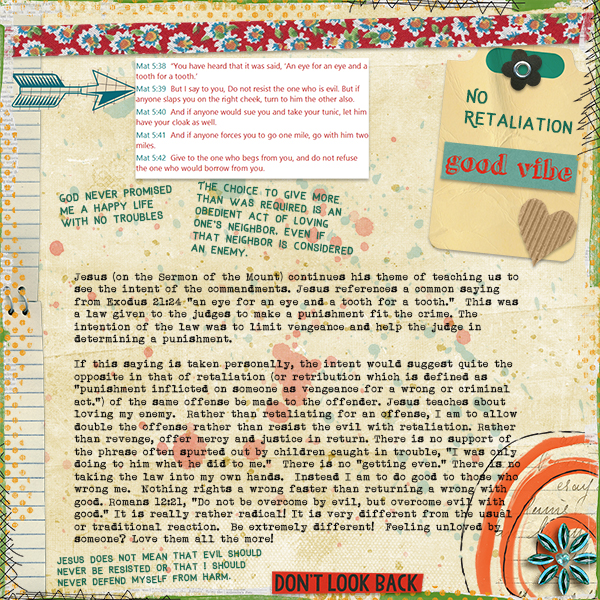My Corner Online
Reading through the Gospels 59
Matthew 5:38-42 and Luke 6:27-30

Matthew 5:38-42 and Luke 6:27-30 RETALIATION
Jesus (on the Sermon of the Mount) continues his theme of teaching us to see the intent of the commandments. Jesus references a common saying from Exodus 21:24 "an eye for an eye and a tooth for a tooth." This was a law given to the judges to make a punishment fit the crime. The intention of the law was to limit vengeance and help the judge in determining a punishment.
If this saying is taken personally, the intent would suggest quite the opposite in that of retaliation (or retribution which is defined as "punishment inflicted on someone as vengeance for a wrong or criminal act.") of the same offense be made to the offender. Jesus teaches about loving my enemy. Rather than retaliating for an offense, I am to allow double the offense rather than resist the evil with retaliation. Rather than revenge, offer mercy and justice in return. There is no support of the phrase often spurted out by children caught in trouble, "I was only doing to him what he did to me." There is no "getting even." There is no taking the law into my own hands. Instead I am to do good to those who wrong me. Nothing rights a wrong faster than returning a wrong with good. Romans 12:21, "Do not be overcome by evil, but overcome evil with good." It is really rather radical! It is very different from the usual or traditional reaction. Be extremely different! Feeling unloved by someone? Love them all the more!
If I am slapped I should turn the cheek and allow the other to be slapped as well.
If someone wins a lawsuit against me and takes my tunic, I should also give him my cloak.
If someone forces me to walk one mile, I should walk two with him.
I should give to the one that begs and the one that borrows. What better way to counteract someone trying to manipulate me than to give freely first.
Loving my enemies is not the natural "fall in love" type of love, but is a conscious effort in their best interests. Love my enemies as I would love myself.
This is not to mean that one who has the authority in a called vocation should also refrain from ordering punishment. Instead of revenge, I should accept that evil will come against myself. God never promised me a happy life with no troubles. Jesus does not mean that evil should never be resisted or that I should never defend myself from harm. Even Jesus turned the tables in the temple. A slap on the cheek in Bible times was understood as an insult, not being hit upside the head with a baseball bat. A Roman soldier could by law force a Jew to carry his pack for one mile, and two miles was easily done by those in Bible times who commonly walked long distances as a way of travel. The choice to give more than was required is an obedient act of loving one's neighbor, even if that neighbor is considered an enemy. "Turning the cheek" is not a natural reaction, but rather the "new life" that we live in Christ. Although Jesus Himself did "turn the cheek" when standing on trial and hanging on the cross. He could have saved Himself. Ultimately God won and God will fight for me as well.